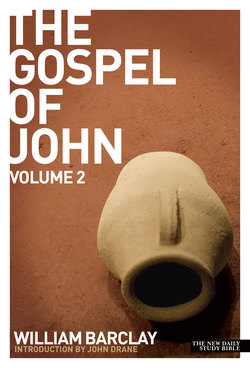Читать книгу New Daily Study Bible: The Gospel of John vol. 2 - William Barclay - Страница 12
На сайте Литреса книга снята с продажи.
ОглавлениеWRETCHEDNESS AND PITY
John 7:53–8:11 (contd)
THIS passage shows us two things about the attitude of the scribes and the Pharisees.
(1) It shows us their conception of authority. The scribes and the Pharisees were the legal experts of the day; problems were taken to them for decision. It is clear that to them authority was characteristically critical, censorious and condemnatory. That authority should be based on sympathy, that its aim should be to reclaim the criminal and the sinner, never entered their heads. They conceived of their function as giving them the right to stand over others like grim invigilators, to watch for every mistake and every deviation from the law, and to descend on them with savage and unforgiving punishment; they never dreamed that it might lay upon them the obligation to cure the wrongdoer.
There are still those who regard a position of authority as giving them the right to condemn and the duty to punish. They think that such authority as they have has given them the right to be moral watchdogs trained to tear the sinner to pieces; but all true authority is founded on sympathy. When the Methodist evangelist George Whitefield saw the criminal on the way to the gallows, he uttered the famous sentence: ‘There, but for the grace of God, go I.’
The first duty of authority is to try to understand the force of the temptations which drove the sinner to sin and the seductiveness of the circumstances in which sin became so attractive. No one can pass judgment on another unless some attempt has been made to understand what the other has come through. The second duty of authority is to seek to reclaim the wrongdoer. Any authority which is solely concerned with punishment is wrong; any authority which, in its exercise, drives a wrongdoer either to despair or to resentment is a failure. The function of authority is not to banish sinners from all decent society, still less to wipe them out; it is to make them into good citizens. Those who are set in authority must be like wise physicians; their one desire must be to heal.
(2) This incident shows vividly and cruelly the attitude of the scribes and Pharisees to people. They were not looking on this woman as a person at all; they were looking on her only as a thing, an instrument whereby they could formulate a charge against Jesus. They were using her, as a person might use a tool, for their own purposes. To them she had no name, no personality, no feelings; she was simply a pawn in the game whereby they sought to destroy Jesus.
It is always wrong to regard people as things; it is always un-Christian to regard people as cases. It was said of Beatrice Webb, afterwards Lady Passfield, the famous economist, that ‘she saw men as specimens walking’. Dr Paul Tournier in A Doctor’s Casebook talks of what he calls ‘the personalism of the Bible’. He points out how fond the Bible is of names. God says to Moses: ‘I know you by name’ (Exodus 33:17). God said to Cyrus: ‘it is I, the Lord, the God of Israel, who call you by your name’ (Isaiah 45:3). There are whole pages of names in the Bible. Dr Tournier insists that this is proof that the Bible thinks of people first and foremost, not as fractions of the mass, or abstractions, or ideas, or cases, but as persons. ‘The proper name’, Dr Tournier writes, ‘is the symbol of the person. If I forget my patients’ names, if I say to myself, “Ah! There’s that gall-bladder type or that consumptive that I saw the other day”, I am interesting myself more in their gall-bladders or in their lungs than in themselves as persons.’ He insists that a patient must be always a person, and never a case.
It is extremely unlikely that the scribes and the Pharisees even knew this woman’s name. To them she was nothing but a case of shameless adultery that could now be used as an instrument to suit their purposes. The minute people become things, the spirit of Christianity is dead.
God uses his authority to love us into goodness; to God no person ever becomes a thing. We must use such authority as we have always to understand and always at least to try to mend the person who has made the mistake; and we will never even begin to do that unless we remember that every man and woman is a person, not a thing.
